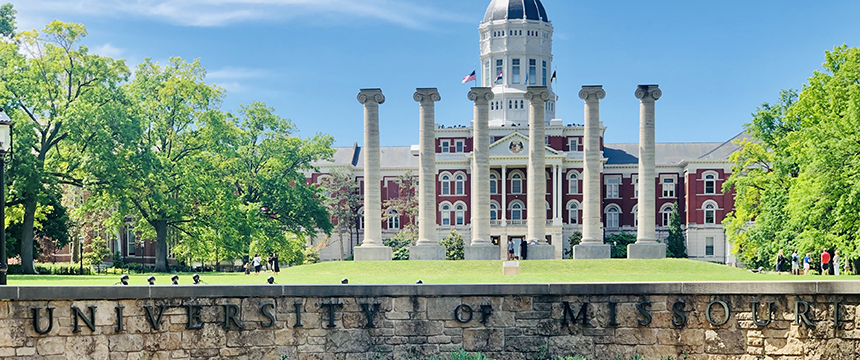Litigating Donor Intent: State ex rel. Board of Curators of University of Missouri v. Green

A recent case involving a gift to endow professorships shows the tension between principles of trust and contract in bequests—and how the difference can have unanticipated and important effects on how disputes are resolved. The Missouri Supreme Court case, State ex rel. Board of Curators of University of Missouri v. Green, 576 S.W.3d 183 (Mo. 2019), focused on the enforcement mechanism of a restricted charitable bequest to the University of Missouri, showing this tension in the context of donor intent.
Background of the Case
The case centered on the will of Sherlock Hibbs. Hibbs was an investment banker and graduate of the University of Missouri who rose to managing partner at Kidder, Peabody & Company. Hibbs was an adherent of free market economics, specifically Ludwig von Mises’ Austrian School of Economics.
Hibbs’ will provided a bequest of $5 million to the University of Missouri (“Mizzou”) to establish six endowments funding chairs and professorships at Mizzou’s Columbia College of Business and Public Administration. Each endowment was to be held separately, and each position was to be reserved for a faculty member who was “a dedicated and articulate disciple of the Ludwig von Mises (Austrian) School of Economics.”1
Hibbs included an elaborate enforcement mechanism in his will. He provided that if the positions were not filled for a period of five years, the money was to go to Hillsdale College (“Hillsdale”), a private school in Michigan known for its free-market fervor.2 Even after the positions were filled, Mizzou was to provide certification to Hillsdale every four years, informing the college of the name and qualifications of each appointee, and certifying that the appointee was a dedicated and articulate disciple of the Mises School of economic thought.3 Under the will, failure to provide the information and certification would “create a legal presumption that the balance of the fund should be distributed to Hillsdale College.”4
Mizzou decided to accept the bequest and fund the chairs and professorships. However, by 2017, Hillsdale determined that Mizzou was improperly using the bequest, and took legal action.
Lawsuit: State ex rel. Board of Curators of University of Missouri v. Green
In 2017, Hillsdale filed a declaratory judgment action in St. Louis County on the grounds that Mizzou was improperly administrating the funds given under Hibbs’ will. Hillsdale alleged that the terms of the bequest had not been complied with and asked the court to order the endowment funds to be turned over to it.5 Hillsdale alleged Mizzou knowingly appointed individuals to the chairs and professorships who were not Austrian economists at all, ultimately providing several million dollars over fifteen years to individuals with economist principles that did not align with Hibbs’ intent.6
In correspondence, Mizzou claimed it had accepted the funds and chosen to “focus on some Austrian tenets that are compatible” with the business school’s teaching philosophy.7
Litigation Centered on Proper Venue
In addition to disputing Hillsdale’s assertions about the use of the funds, Mizzou’s response asserted that venue was improper.8 Hillsdale had filed its suit in St. Louis County, which was a proper venue for a contract dispute. This characterization of the dispute as being one of contract law lay at the center of ensuing procedural motion practice that was really more about trying to secure a neutral forum for the lawsuit.
Mizzou argued the suit was actually governed by the state’s trust statute, which provides that proper venue for judicial proceedings involving trust administration is the probate division of the circuit court where the trust is registered, or could be properly registered if the trust is not registered in the state.9 Under the statute, Mizzou reasoned, the dispute must be brought in the Boone County probate court because Boone County is where the trust is or should be registered.10 As the home of Mizzou’s main campus, Mizzou likely anticipated that Boone County would be a very friendly venue for the school (just as Hillsdale likely expected it to be a hostile forum).
Mizzou filed a motion to change venue, which was overruled by the trial court. After Hillsdale filed two amended petitions, both challenged by Mizzou on the basis of venue, with the court overruling Mizzou’s motion each time, Mizzou sought a writ of mandamus from the Supreme Court of Missouri.
In its Supreme Court brief, Mizzou’s argument focused on the plain language of the will to assert that the suit was a matter of trust administration.11 The will’s language referred to the bequest as made to the Curators “as trustees, in trust” with Hillsdale named to receive the funds if the terms of the bequest were not fulfilled.12 Mizzou argued that, since other bequests in the will were not made in trust, Hibbs’ intention to make the gift in trust was clear.13
Hillsdale disputed that Hibbs’ intention was clear. Hillsdale argued that courts have long held that the use of the word “trust” in a bequest does not necessarily create a trust. It argued that certain departures from the format of a typical trust, such as an ambiguity as to who the trustee would be, and the inclusion of a rare forfeiture clause transferring the property to Hillsdale if Hibbs’ conditions were not met, rendered Hibbs’ intentions uncertain.14 Hillsdale argued that Hibbs’ bequest in the will had not created a trust, but instead required Hibbs’ executor to enter into implied contracts to govern the gift (with Hillsdale as a third-party beneficiary of the contracts).15
Mizzou’s rebuttal argued that there was no contract, because the required elements for a contract–offer, acceptance, and bargained for consideration–were not present.16
In its decision, the Supreme Court of Missouri sided with Mizzou and ruled, in a short, direct opinion focusing on the venue issue, that Hibbs’ gift was made in trust and that Boone County was the proper venue. The court’s ruling focused on the references to a “trust” in the will. The short decision did not address many of the issues raised by Hillsdale, such as the ambiguity regarding the designated trustees of the trust.
Lawsuit Settlement
Following the court’s decision, the two parties settled. Mizzou agreed to pay Hillsdale half of the value of the endowment, but would continue to hold and administer the remaining half, with no further oversight from Hillsdale.17 At the time of the settlement, the endowment was worth approximately $9.2 million, of which Hillsdale received half (approximately $4.6 million).18 In a statement following the resolution of the case, a Mizzou spokesperson indicated that the money from Hibbs’ bequest would continue to be used to educate students about “free and open markets,” stating the parties have “agreed to disagree on their differing interpretations of the gift requirements.”19
Lesson from Green
Capturing donor intent for a charitable bequest can be difficult. The parties here had different interpretations of the Hibbs’ intent as written in the will, but despite litigation that ended at the Missouri Supreme Court, no court ever reached the substance of what Hibbs intended for his funds (the parties agreed to disagree on that point). Instead, the process question of venue swallowed the question of intention, and it’s a safe bet that was not Hibbs’ intent. A draftsman who creates differing rights in two parties as a way to enforce intent has to carefully consider how those rights will work in litigation.
————————————————————-
1 State ex rel. Board of Curators of University of Missouri v. Green, 576 S.W.3d 183 (Mo. 2019).
2 Brief for Respondent, State ex rel. Board of Curators of University of Missouri v. Green, 576 S.W.3d 183 (Mo. 2019) (no. SC97418), 2019 WL 330456.
3 Id.
4 Brief for the Curators of the University of Missouri as Relator, State ex rel. Board of Curators of University of Missouri v. Green, 576 S.W.3d 183 (Mo. 2019) (no. SC97418), 2018 WL 7106675.
5Id.
6 Brief for Respondent, State ex rel. Board of Curators of University of Missouri v. Green, 576 S.W.3d 183 (Mo. 2019) (no. SC97418), 2019 WL 330456.
7 Id.
8 Brief for the Curators of the University of Missouri as Relator, State ex rel. Board of Curators of University of Missouri v. Green, 576 S.W.3d 183 (Mo. 2019) (no. SC97418), 2018 WL 7106675.
9 RSMo. § 456.2-204.
10 Brief for the Curators of the University of Missouri as Relator, State ex rel. Board of Curators of University of Missouri v. Green, 576 S.W.3d 183 (Mo. 2019) (no. SC97418), 2018 WL 7106675.
11 Brief for the Curators of the University of Missouri as Relator, State ex rel. Board of Curators of University of Missouri v. Green, 576 S.W.3d 183 (Mo. 2019) (no. SC97418), 2018 WL 7106675; Reply Brief for the Curators of the University of Missouri as Relator, State ex rel. Board of Curators of University of Missouri v. Green, 576 S.W.3d 183 (Mo. 2019) (no. SC97418), 2019 WL 496677.
12 Brief for the Curators of the University of Missouri as Relator, State ex rel. Board of Curators of University of Missouri v. Green, 576 S.W.3d 183 (Mo. 2019) (no. SC97418), 2018 WL 7106675.
13 Id.
14 Brief for Respondent, State ex rel. Board of Curators of University of Missouri v. Green, 576 S.W.3d 183 (Mo. 2019) (no. SC97418), 2019 WL 330456.
15 Id.
16 Reply Brief for the Curators of the University of Missouri as Relator, State ex rel. Board of Curators of University of Missouri v. Green, 576 S.W.3d 183 (Mo. 2019) (no. SC97418), 2019 WL 496677.
17 AP News, Hillsdale College, Missouri settle lawsuit over endowment, AP. December 18, 2019. https://apnews.com/4db3fb7fa202234b220c803626464a3f
18 Jae, Emily Koons, Lessons on legacy giving from the Sherlock Hibbs endowment. Philanthropy Daily. January 27, 2020. https://www.philanthropydaily.com/lessons-on-legacy-giving-from-the-sherlock-hibbs-endowment/.
19 Basi, Christian, University of Missouri, Hillsdale settle lawsuit, Mizzou News, University of Missouri, December 18, 2019. https://news.missouri.edu/2019/university-of-missouri-hillsdale/


